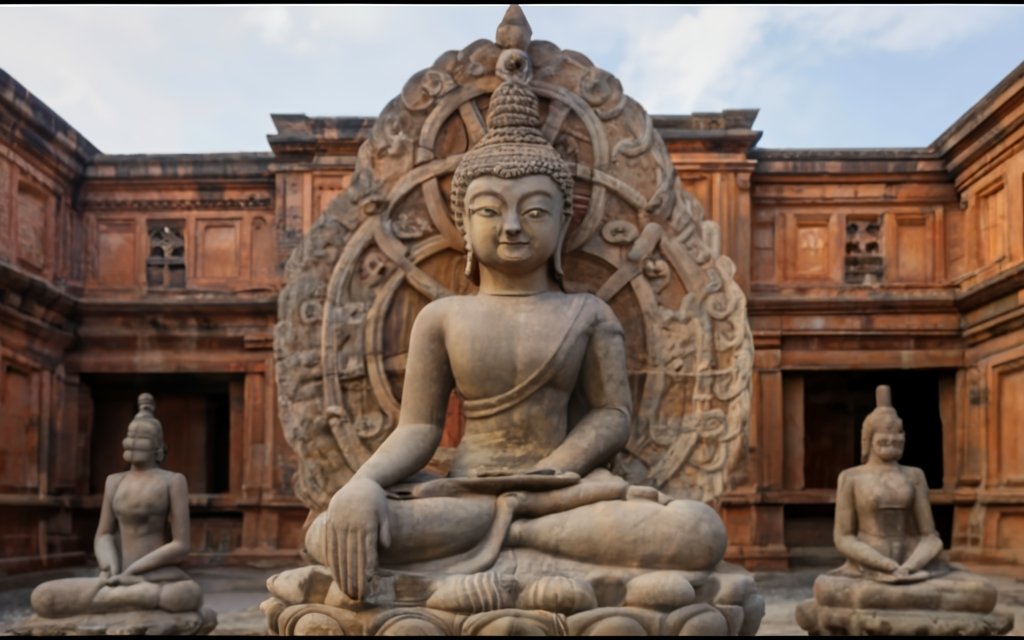Which Religion is Buddha? Unraveling the Mysteries of Buddhism
Buddhism, often shrouded in mystery and intrigue, has captivated the minds of many. With its profound philosophy and spiritual teachings, it has left countless individuals pondering the question, “Which religion is Buddha?” In this article, we will delve into the depths of Buddhism, exploring its origins, beliefs, and whether it can be classified as a religion or something more.
The Origin of Buddhism

Buddhism: A Philosophical Journey
Buddhism, founded by Siddhartha Gautama, who later became known as Buddha, emerged in the 6th century BCE in ancient India. Initially, it was more of a philosophical journey than a traditional religion. Siddhartha’s quest for enlightenment led him to profound insights about human suffering and the path to liberation from it.
Is Buddhism Older than Hinduism?

One commonly asked question is whether Buddhism is older than Hinduism, given that both religions originated in India. The answer is that Buddhism is younger than Hinduism, as it branched off from the existing spiritual traditions in India. Hinduism, with its ancient roots, predates Buddhism by centuries.
Buddhism: Religion or Philosophy?

The Spiritual Dimensions
At its core, Buddhism explores deep spiritual questions about the nature of existence, suffering, and the path to enlightenment. This spiritual dimension often prompts people to ask, “Is Buddhism a religion?”
A Way of Life
Buddhism can also be seen as a way of life, guiding individuals toward ethical and moral living. It encourages the cultivation of virtues such as compassion, mindfulness, and wisdom. This aspect of Buddhism blurs the line between religion and philosophy.
Religion, Philosophy, or Both?
Buddhism’s multifaceted nature makes it challenging to categorize definitively as either a religion or a philosophy. It encompasses elements of both, making it a unique and intricate belief system.
The Global Impact of Buddhism Around the World

Buddhism’s influence is not confined to its country of origin. It has spread across the globe, touching the lives of millions. From Asia to the Americas, Buddhism has found a home in various cultures, adapting and evolving as it goes.
A Religion of Peace
One of the noteworthy aspects of Buddhism is its emphasis on peace and non-violence. This commitment to peaceful coexistence has earned it a reputation as a “religion of peace,” resonating with people seeking harmony in their lives.
Buddhism: Religion in India

Buddhism’s Roots in India
To gain a deeper understanding of whether Buddhism is a religion, it’s essential to examine its historical and cultural context in India. Buddhism originated in India, and its early development was deeply intertwined with the diverse religious landscape of the region.
Buddhism vs. Hinduism
Comparing Buddhism to Hinduism sheds light on its religious nature. Hinduism, with its vast pantheon of deities and complex rituals, is undeniably a religion. In contrast, Buddhism, founded on the principles of the Four Noble Truths and the Eightfold Path, appears more as a spiritual and philosophical tradition.
Buddhism: Religion or Philosophy Essay

Philosophical Underpinnings
In an essay exploring whether Buddhism is a religion or philosophy, it’s crucial to delve into its philosophical foundations. Buddhism’s core teachings emphasize the impermanence of life, the cessation of suffering, and the pursuit of enlightenment, all of which are central to philosophical inquiry.
Spiritual Practices
Buddhist spiritual practices, including meditation and mindfulness, play a pivotal role in the lives of its followers. These practices are not mere philosophical exercises but are deeply intertwined with the spiritual and religious aspects of Buddhism.
Buddhism’s Influence on Chinese Culture

Buddhism in China
China has a rich history of integrating Buddhism into its culture. The arrival of Buddhism in China brought with it profound changes in art, architecture, and philosophy. This cultural exchange illustrates the deep spiritual and religious connections of Buddhism.
Buddhism: A Cultural and Spiritual Bridge
Buddhism served as a bridge between India and China, not only in terms of religious ideas but also as a means of cultural exchange. This reinforces the idea that Buddhism is not just a philosophy but a religion with a transformative impact.
Buddhism: Spirituality and Belief

Spirituality in Buddhism
While Buddhism is often associated with spirituality, it’s essential to explore how it differs from traditional religions. Buddhism focuses on personal spiritual growth and liberation from suffering rather than worship of deities, a characteristic more aligned with spirituality than conventional religious practices.
A System of Belief
In essence, Buddhism can be seen as a system of belief centered on the teachings of Buddha. Followers place their faith in these teachings as a means to attain enlightenment and spiritual liberation, aligning it more with religion than mere philosophy.
Unraveling the Complexity
In this exploration of Buddhism’s nature, we’ve uncovered the complexities surrounding its classification as a religion or philosophy. While it carries aspects of both, it defies easy categorization due to its historical, philosophical, and spiritual depth. Whether one views Buddhism as a religion, philosophy, way of life, culture, spirituality, or belief system, it is undeniably a profound and influential force in the world.
As we continue to ponder the question, “Which religion is Buddha?” it becomes evident that the answer lies in the eye of the beholder. Buddhism’s multifaceted identity offers individuals a wide range of interpretations and experiences, making it a dynamic and endlessly fascinating subject of study and contemplation. Ultimately, the true essence of Buddhism lies in its ability to provide guidance, wisdom, and a path to spiritual enlightenment, regardless of the label we choose to assign it.
Conclusion: Embracing the Diversity of Buddhism

In conclusion, the multifaceted nature of Buddhism allows us to embrace its diversity. As we navigate the question of “Which religion is Buddha?” we must recognize that Buddhism transcends singular categorization. It encompasses philosophical depth, spiritual growth, ethical living, cultural exchange, and belief systems.
Buddhism’s evolution from its origins in India to its global presence underscores its adaptability and appeal to seekers of wisdom and truth worldwide. Whether we view it as a religion, a philosophy, or a fusion of both, Buddhism remains an influential and transformative force.
FAQ: Exploring Buddhism’s Complex Identity
Q1: Is Buddhism a Religion or a Philosophy?
A1: Buddhism’s identity is a complex interplay of religious and philosophical elements. It offers profound philosophical insights into the nature of existence, suffering, and enlightenment, making it more than just a religion.
Q2: How Does Buddhism Compare to Hinduism?
A2: Buddhism and Hinduism, both originating in India, share historical roots but differ in their religious aspects. Hinduism is a religion with a rich pantheon of deities and rituals, while Buddhism leans more towards philosophical and spiritual teachings.
Q3: What Role Does Meditation Play in Buddhism?
A3: Meditation is a core practice in Buddhism, serving as a means to achieve mindfulness, self-awareness, and ultimately, enlightenment. It exemplifies the spiritual and religious dimensions of Buddhism.
Q4: How Has Buddhism Influenced Different Cultures?
A4: Buddhism’s global spread has left a significant mark on various cultures, influencing art, architecture, literature, and philosophy. Its role as a cultural and spiritual bridge between India and other nations is noteworthy.
Q5: Can Buddhism Be Considered a System of Belief?
A5: Yes, Buddhism can be seen as a system of belief, as its followers place faith in the teachings of Buddha to guide them towards spiritual liberation. This aspect aligns it more closely with religion than mere philosophy.
Q6: Why Is Buddhism Often Associated with Peace?
A6: Buddhism’s emphasis on non-violence, compassion, and inner peace has earned it a reputation as a “religion of peace.” These principles form a core part of its spiritual and ethical teachings.
In this FAQ section, we’ve addressed common queries surrounding Buddhism’s identity, clarifying its religious, philosophical, and spiritual aspects. These questions shed light on the intricate nature of Buddhism and its ability to defy easy categorization, making it a subject of enduring fascination and exploration.






